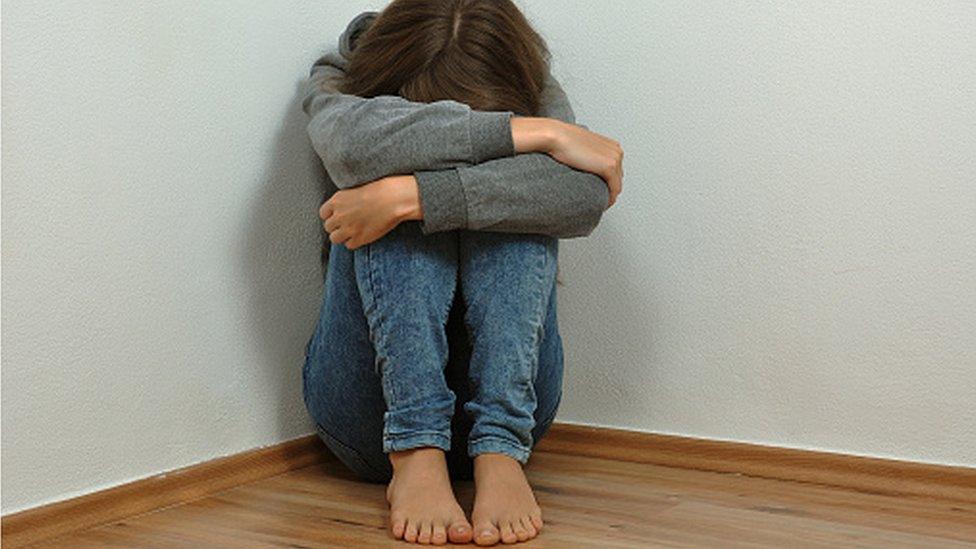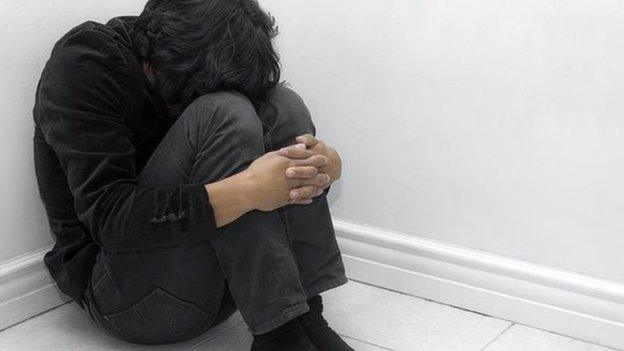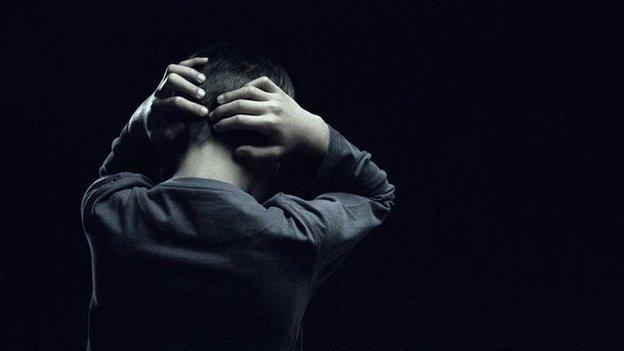Self-harm hospital admissions of children show 'frightening rise'
- Published

Self-harming was a massive release for Sophie at a difficult time in her life, but she ended up in hospital aged 15 - like thousands of other children in England and Wales.
The children's charity NSPCC says nearly 19,000 children were admitted to hospital after harming themselves last year - a 14% rise over three years.
It called the figures "frightening".
And it said they should be a "wake-up call" to all those who care about the wellbeing of young people.
Sophie Allen, who is now 32, started self-harming at the age of about 11 or 12.
She said she "stumbled" across self-harm after accidentally hurting herself at a time when she was feeling particularly low after a lot of transitions and change in her life, and being bullied.
'The shames sets in'
"I just felt so distracted from the inner turmoil because I was so focused on the physical injury, that when I felt low again I remembered what distracted me before," she told BBC Radio 5 Live.
"It was just a way to share the distress that I was feeling without being able to find the words to say that I was struggling."
She described the feeling at the time as a "massive release - people cannot understand that the process is like a weight being lifted".
"However, that's very, very short-lived... a few hours later the shame sets in, the guilt sets in."
Ms Allen, who work for Harmless - a self-harming charity in the East Midlands, said she was finally treated when she attempted suicide at 15 and ended up in hospital.
At that point she was also referred for counselling.
'Terrible damage'
The NSPCC's figures, collected from all but six NHS Trusts in England and health boards in Wales, reveal that 18,788 under-18s were admitted to hospital or treated at accident and emergency units for self-harm in 2015-16.
This compares with 16,416 admissions for self-harm in 2013-14.
Official figures from NHS Digital show admissions for self-harm have been increasing for five years in a row.
Dr Virginia Davies tells Radio 4's Today rise in self-harm is down to underinvestment in services
Experts say better recording of data by hospitals may be reflected in the rise.
Peter Wanless, chief executive of the NSPCC, said the numbers were "frightening".
"Knowing hospital beds are full of young people crying out for help should be a real wake-up call to all those that care for the wellbeing of the younger generation," he said.
"It is vital we confront the fact that an increasing number are struggling to deal with the pressures and demands of modern-day life, to such an extent they are inflicting terrible damage upon themselves."
'Epidemic level'
Self-harming is one of the most common reasons for children to contact the charity's Childline service.
About 50 children a day are given counselling on the issue, it said, and last year the helpline dealt with more than 18,000 calls about self-harm.
Teenagers aged 13 to 17 are most likely to end up in hospital after cutting their bodies, overdosing on pills or burning themselves.
Dame Esther Rantzen, president of Childline, said: "Self-harming is at epidemic level among young people."
She said young people often felt ashamed and scared to ask for help from those closest to them, and it was not until they had seriously harmed themselves that they were rushed to hospital.

How to help a child who is self-harming?
Listen, understand and show empathy
Talk it over and try to work how what is making them self-harm
Build up their confidence and show they can trust you
Help them find new ways to cope
Children and young people can contact Childline for free, confidential support and advice, 24 hours a day on 0800 1111 or on their website, external.

Dr Max Davie, from the Royal College of Paediatrics and Child Health, said schools should be offering more support.
"One way of providing this early intervention is for all schools to deliver comprehensive Personal Social Health Economic (PSHE) education," he said.
This would teach children "about emotional wellbeing and addressing challenging mental health issues such as eating disorders, self-harm and suicide - in addition to other important topics like positive relationships, sex education and the dangers of drugs and alcohol abuse."
Schools are not currently obliged to offer PSHE.
- Published17 February 2015

- Published12 December 2014
